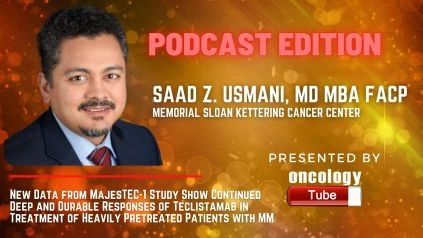Saad Z. Usmani, MD MBA FACP, Chief, Myeloma Service at Memorial Sloan Kettering Cancer Center speaks about New Data from MajesTEC-1 Study Show Continued Deep and Durable Responses of Teclistamab (BCMAxCD3 Bispecific Antibody) in Treatment of Heavily Pretreated Patients with Multiple Myeloma.
The MajesTEC-1 study of teclistamab, an off-the-shelf T-cell experimental redirecting bispecific antibody, is being evaluated for the treatment of patients with relapsed or refractory multiple myeloma. An overall response rate (ORR) of 62 percent was observed in heavily pretreated patients (n=150) across the Phase 1 and 2 studies who had received at least three prior lines of therapy and were triple-class exposed after a median follow-up of nearly eight months at the recommended subcutaneous (SC) Phase 2 dose (RP2D) of 1.5 mg/kg. 1 The findings were presented as an oral presentation (Abstract # 896) at the American Society of Hematology (ASH) 2021 Annual Meeting and were chosen as part of the Highlights of ASH program. 1
Highlights from MajesTEC-1
An ORR of 62 percent (93/150; 95 percent confidence interval [CI], range, 53.7–69.8) was seen after a median follow-up of approximately eight months; ORR was consistent regardless of cytogenetic risk or the level of preceding therapeutic refractoriness.
1 The median duration of response had not been attained at the clinical cutoff, and 88 percent (82/93) of responders were still alive and receiving therapy. 1 According to the findings, teclistamab responses were long-lasting and deepened over time. 1 The median duration to first confirmed response was 1.2 months among those who responded (range 0.2-5.5 months). 1
Patients who received teclistamab had a very good partial response (VGPR) or better in 58% of cases, a complete response (CR) in 29% of cases, and a strict complete response in 21% of cases (sCR).
1 At a threshold of 10-5 (95 percent CI, range, 18.0–32.4), 25% of patients (37/150) achieved MRD negative by intent to treat. 1 The MRD negativity rate was 42 percent in patients who obtained CR or better. 1 At 9 months, the progression-free survival (PFS) rate was 59 percent (95 percent confidence interval: 48.8–67.0). Overall survival (OS) was not obtained at the median. 1
In both Phase 1 and Phase 2 of MajesTEC-1.1, 165 patients were treated with teclistamab at the SC 1.5 mg/kg dose as of September 2021. The MajesTEC-1 Phase 1 study (NCT03145181) had two main goals: to define the recommended SC RP2D (part 1) and to assess the safety and tolerability of teclistamab at the RP2D. (part 2). The primary goal of the MajesTEC-1 Phase 2 study (NCT04557098) was to assess the efficacy of teclistamab at the RP2D, as determined by ORR, at SC 1.5 mg/kg QW.
The safety profile of teclistamab was reasonable, and no patients required a dose reduction.
1 cytokine release syndrome (72 percent; all grade 1/2 except for one grade 3 event that fully resolved; all resolved with no treatment discontinuation), injection site erythema (26 percent; all grade 1/2), and fatigue (25 percent; 2% grade 3/4) were the most common nonhematologic adverse events (AEs). 1 Neutropenia (66 percent; 57 percent grade 3/4), anemia (50 percent; 35 percent grade 3/4), and thrombocytopenia (38 percent; 21 percent grade 3/4) were the most prevalent hematologic AEs. 1 Immune effector cell-associated neurotoxicity syndrome (ICANS) struck five patients (3 percent; all grade 1/2), although they all recovered without treatment. 1
Highlights from the TRIMM-2 data
A poster session at ASH on Saturday, December 11 (Abstract #1647) presented further results on teclistamab. The TRIMM-2 study (NCT04108195) found that teclistamab in combination with DARZALEX FASPRO® (daratumumab and hyaluronidase-fihj), a CD38-directed monoclonal antibody approved for subcutaneous administration in patients with multiple myeloma, had a manageable safety profile and preliminary efficacy in patients with relapsed or refractory disease who had received at least three.

